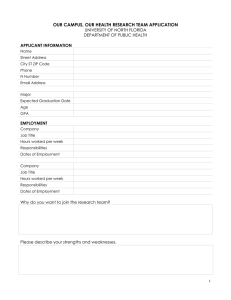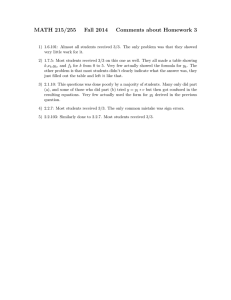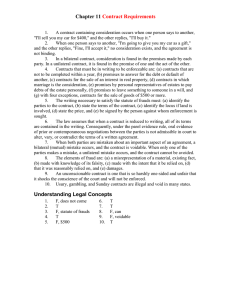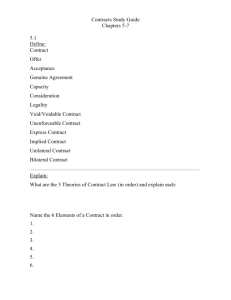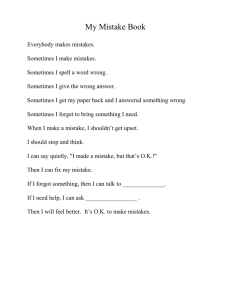Business Law Chapter 6 Study Guide
advertisement
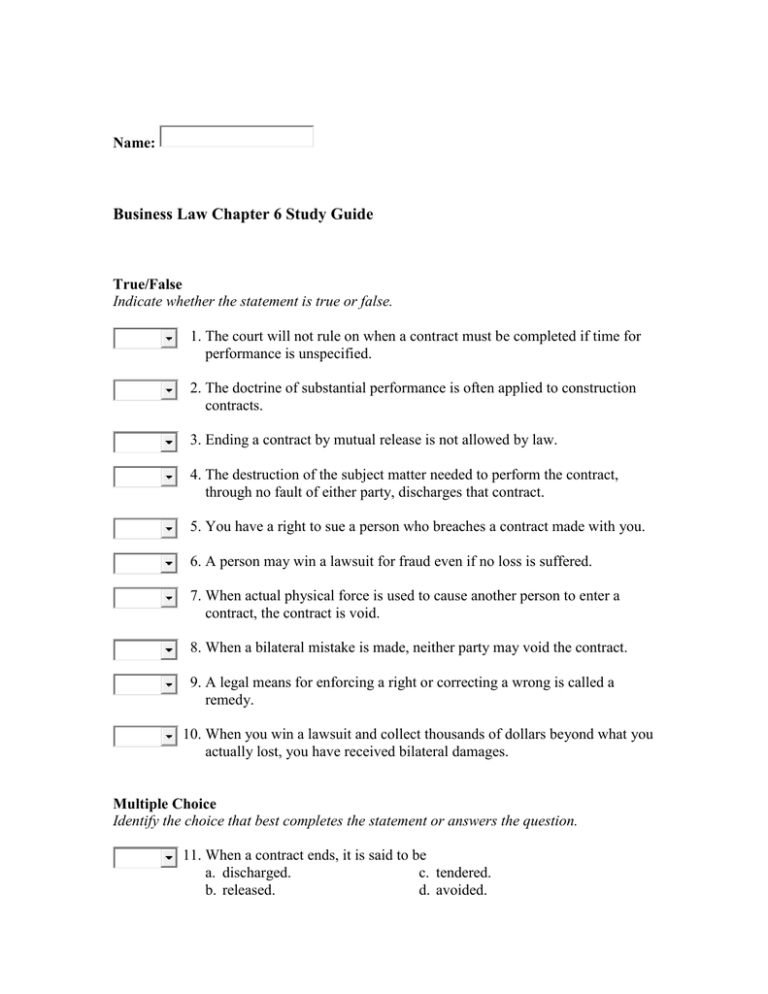
Name: Business Law Chapter 6 Study Guide True/False Indicate whether the statement is true or false. 1. The court will not rule on when a contract must be completed if time for performance is unspecified. 2. The doctrine of substantial performance is often applied to construction contracts. 3. Ending a contract by mutual release is not allowed by law. 4. The destruction of the subject matter needed to perform the contract, through no fault of either party, discharges that contract. 5. You have a right to sue a person who breaches a contract made with you. 6. A person may win a lawsuit for fraud even if no loss is suffered. 7. When actual physical force is used to cause another person to enter a contract, the contract is void. 8. When a bilateral mistake is made, neither party may void the contract. 9. A legal means for enforcing a right or correcting a wrong is called a remedy. 10. When you win a lawsuit and collect thousands of dollars beyond what you actually lost, you have received bilateral damages. Multiple Choice Identify the choice that best completes the statement or answers the question. 11. When a contract ends, it is said to be a. discharged. c. tendered. b. released. d. avoided. 12. An offer to do what you have agreed to do under a contract is called a. substantial performance. c. tender of performance. b. accord and satisfaction. d. satisfactory performance. 13. Specific performance asks the court to order the other party in a contract to a. pay the contract in full. c. stop doing what the contract says. b. obey all injunctions d. do what he or she has agreed to immediately. do. 14. Wrongful acts of one of the parties may discharge a contract by a. the Wrongful Act Statute. c. operation of law. b. the statute of limitations. d. mutual release. 15. The legal transfer of a right under contract is called a(n) a. alteration. c. novation. b. assignment. d. delegation. 16. Threats of a business nature that cause a person to enter into a contract without real consent would qualify as a. undue influence. c. economic duress. b. duress. d. fraud. 17. A deliberate deception to secure unfair or unlawful gain is called a. misrepresentation. c. a unilateral mistake. b. libel. d. fraud. 18. Which of the following is NOT a remedy for a breach of contract? a. You may request the contract be continued. b. You may accept the breach. c. You may sue for damages. d. You may ask the court for a remedy. 19. Mutual mistake is also known as a. unilateral mistake. b. material mistake. c. bilateral mistake. d. intentional mistake. 20. If what seems to be a valid contract turns out not to be, the contract is a. fraudulent. c. defective. b. deceptive. d. mistaken. Completion Complete each statement. 21. As long as all terms have been carried out properly and completely, the contract is discharged by ____________________. 22. When both parties have fulfilled the terms of the contract, ____________________ has taken place. 23. Under the doctrine of ____________________, when someone fulfills the major requirements of a contract (leaving only minor details unfinished), the contract is completed. 24. A(n) ____________________ is an agreement between two parties to end an agreement. 25. If the time for performance is not mentioned in a contract, the court will say the contract must be completed in a time that is suitable and fair, or in ____________________. 26. A(n) ____________________ mistake is an error on the part of one of the parties to a contract. 27. To prove ____________________, the innocent party has to show that he or she depended on the lie. 28. A person who intentionally fails to reveal an important fact is committing the fraud of ____________________. 29. When actual physical force is used to cause another to enter a contract, the contract is ____________________. Matching Match each term with its definition. a. discharge by agreement f. b. performance g. c. assignment h. d. delegation i. e. substantial performance j. tender undue influence breach of contract statute of limitations fraud 30. When the party completes the major requirements of a contract with only a few minor details remaining 31. The transfer of a duty under a contract 32. A deliberate deception intended to serve an unfair gain 33. A time limit for suing in a civil case 34. Both parties agree to end the contract 35. The transfer of a right under a contract 36. Actions that make inappropriate use of one person’s power over another 37. An offer to do what you have agreed to do under a contract 38. When the parties fulfill the terms of a contract by doing what they promised earlier 39. When a person fails to perform the duties of the contract Short Answer 40. Describe the ways a contract can be discharged, and discuss these in detail.

